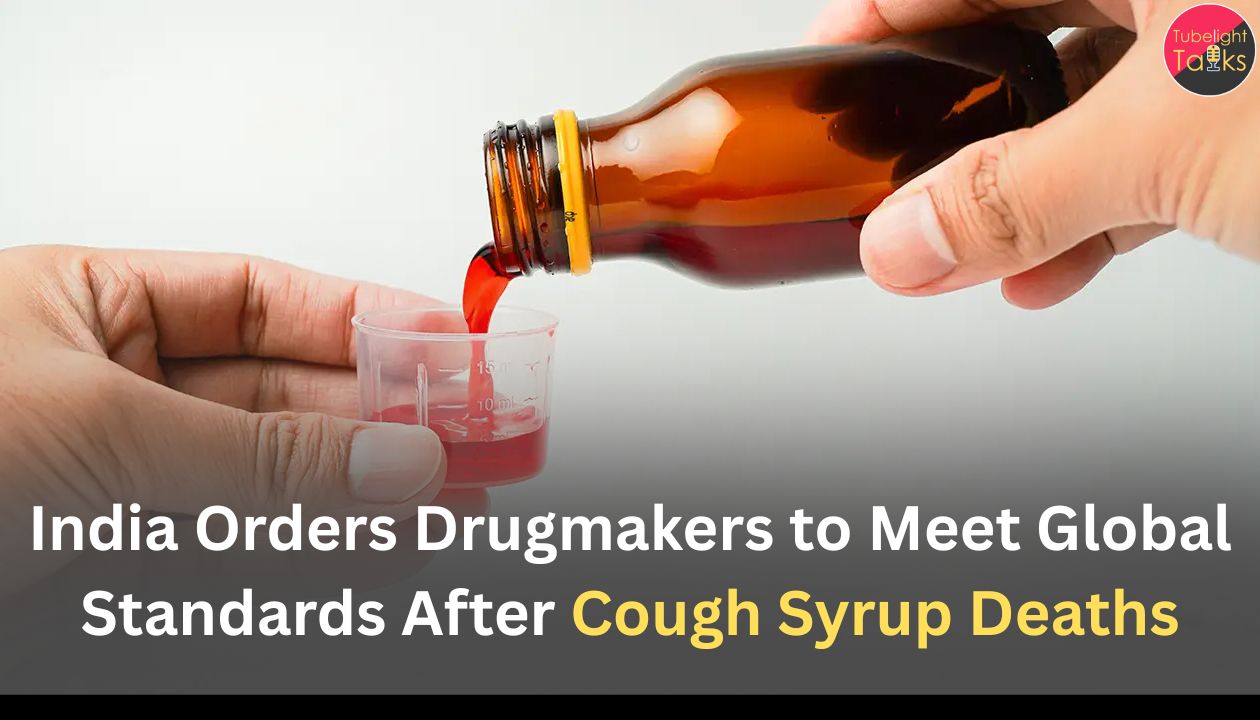India Orders Drugmakers to Meet Global Standards After Cough Syrup Deaths
India Orders Drugmakers to Meet Global: In a decisive move to restore global trust, the Indian government has directed all pharmaceutical companies to adhere to World Health Organization (WHO) standards for manufacturing drugs, particularly syrups for export. This comes in the wake of multiple deaths of children in The Gambia, Uzbekistan, and Cameroon, which were linked to Indian-manufactured cough syrups found to contain toxic substances.
Background: The Global Tragedy
What Triggered the Action?
Between 2022 and 2024, at least 141 children across three countries died after consuming contaminated cough syrups manufactured by Indian firms:
- Maiden Pharmaceuticals (Haryana)
- Marion Biotech (Noida)
Lab tests from WHO and local health authorities revealed the presence of diethylene glycol (DEG) and ethylene glycol (EG) — industrial solvents that can cause kidney failure, seizures, and death when ingested.
India’s New Pharma Directive
Ministry of Health’s Orders
The Ministry of Health and Family Welfare has now:
- Made WHO-Good Manufacturing Practices (GMP) mandatory for all drug exporters
- Ordered state drug controllers to inspect all facilities within 3 months
- Launched a centralized online database for batch tracking and testing results
Industry-Wide Impact
How Many Companies Are Affected?
- India has over 10,500 registered drug manufacturers
- Only 2,000+ currently meet WHO-GMP standards
- The remaining 8,000+ firms have been given six months to comply or face export bans
This affects especially small and medium-sized pharma exporters, many of whom rely on outdated protocols and limited testing infrastructure.
India’s Global Role in Pharma
India is often dubbed the “Pharmacy of the World”, exporting to over 200 countries, including:
- Africa (a key market for pediatric drugs)
- Southeast Asia
- Latin America
The country is a leading supplier of low-cost generics, HIV/AIDS drugs, and pediatric formulations.
However, this reputation has taken a hit due to the recent incidents.
Compliance Measures
What Companies Must Now Do:
- Upgrade their plants with validated equipment and clean-room systems
- Train staff on pharma-grade contamination protocols
- Submit to surprise inspections and random sample tests
- Integrate barcode-based traceability for all batches
International buyers like the UNICEF and Global Fund have also revised their procurement terms to demand real-time quality certifications.
Reactions from Industry and Public Health Experts
Support with Caution
While the pharmaceutical lobby (including Indian Drug Manufacturers’ Association) supports safety compliance, they’ve requested:
- Financial aid or subsidies for infrastructure upgrades
- Technical training assistance
- A 6–12 month grace period for complete implementation
Public health experts, however, warn against delays, citing potential reputational and humanitarian costs if more tragedies occur.
Ethical Conduct in Business: When Profit Hurts Lives – A Wake-Up Call
These tragedies are a reminder that human life must never be compromised for profit. According to Sant Rampal Ji Maharaj, every action — especially in professions that affect health and life — must be guided by Dharma (righteousness), truth, and spiritual accountability.
“Business must serve humanity, not destroy it. Every grain earned through deception is a burden on the soul.”
Through Sat Gyaan, one understands that ethical practices are not just legal obligations, but spiritual imperatives. Those who knowingly distribute harmful products accumulate sin, which no worldly success can erase — only the Supreme God can forgive, if one turns to true devotion and righteous living.
Explore more teachings at JagatGuruRampalJi.org or YouTube Channel
Call to Action: Demand Accountability, Prioritize Health
What Can Citizens and Policymakers Do?
1. Support Regulatory Reform
Push for stronger monitoring of pharma exports and transparent reporting.
2. Hold Brands Accountable
Avoid products from blacklisted companies. Encourage whistleblower protection in pharma labs.
3. Choose Ethics Over Profits
If you’re in the medical or pharmaceutical field, remember — saving lives > making margins.
4. Encourage Spiritual Responsibility
Business leaders must consider the moral and spiritual consequences of their decisions.
Read Also: Food Adulteration: A Hidden Crisis Threatening Health, Economy and Trust
FAQs: India Orders Drugmakers to Meet Global Standards After Cough Syrup Deaths
1. Why are Indian cough syrups being blamed?
Lab tests by WHO and national regulators found toxic solvents in syrups exported from India, linked to deaths in multiple countries.
2. Which companies were involved?
Maiden Pharma and Marion Biotech have been blacklisted. Their licenses have been suspended.
3. What is WHO-GMP certification?
It’s a set of global manufacturing standards designed to ensure the quality and safety of medicines.
4. What is the deadline for compliance?
Companies have 6 months to upgrade and secure certification or face export restrictions.
5. Will this impact India’s drug exports?
Temporarily, yes. But in the long term, it aims to restore credibility and protect patient lives worldwide.
6. What steps is the government taking?
Nationwide inspections, mandatory GMP, and a digital tracking system are being rolled out under Health Ministry oversight.











Discussion (0)